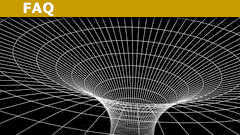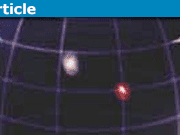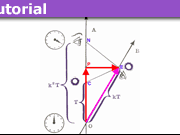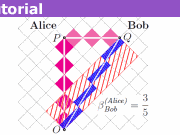How Fast Do Changes in the Gravitational Field Propagate?
General relativity predicts that disturbances in the gravitational field propagate as gravitational waves, and that low-amplitude gravitational waves travel at the speed of light. Gravitational waves have never been detected directly, but the loss of energy from the Hulse-Taylor binary pulsar has been checked to high precision against GR’s predictions of the power emitted in the form of gravitational waves. Therefore it is extremely unlikely that there is anything seriously wrong with general relativity’s description of gravitational waves.
Why does it make sense that low-amplitude waves propagate at c? In Newtonian gravity, gravitational effects are assumed to propagate at infinite speed, so that for example the lunar tides correspond at any time to the position of the moon at the same instant. This clearly can’t be true in relativity, since simultaneity isn’t something that different observers even agree on. Not only should the “speed of gravity” be finite, but it seems implausible that that it would be greater than c; based on symmetry properties of spacetime, one can prove that there must be a maximum speed of cause and effect.[Ignatowsky, Pal] Although the argument is only applicable to special relativity, i.e., to a flat spacetime, it seems likely to apply to general relativity as well, at least for low-amplitude waves on a flat background. As early as 1913, before Einstein had even developed the full theory of general relativity, he had carried out calculations in the weak-field limit that showed that gravitational effects should propagate at c. This seems eminently reasonable, since (a) it is likely to be consistent with causality, and (b) G and c are the only constants with units that appear in the field equations, and the only velocity-scale that can be constructed from these two constants is c itself.
High-amplitude gravitational waves need *not* propagate at c. For example, GR predicts that a gravitational-wave pulse propagating on a background of curved spacetime develops a trailing edge that propagates at less than c.[MTW, p. 957] This effect is weak when the amplitude is small or the wavelength is short compared to the scale of the background curvature.
It is difficult to design empirical tests that specifically check propagation at c, independently of the other features of general relativity. The trouble is that although there are other theories of gravity (e.g., Brans-Dicke gravity) that are consistent with all the currently available experimental data, none of them predict that gravitational disturbances propagate at any other speed than c. Without a test theory that predicts a different speed, it becomes essentially impossible to interpret observations so as to extract the speed. In 2003, Fomalont published the results of an exquisitely sensitive test of general relativity using radar astronomy, and these results were consistent with general relativity. Fomalont’s co-author, the theorist Kopeikin, interpreted the results as verifying general relativity’s prediction of propagation of gravitational disturbances at c. Samuel and Will published refutations showing that Kopeikin’s interpretation was mistaken, and that what the experiment really verified was the speed of light, not the speed of gravity.
W.v.Ignatowsky, Phys. Zeits. 11 (1911) 972
Palash B. Pal, “Nothing but Relativity,” Eur.J.Phys.24:315-319,2003, http://arxiv.org/abs/physics/0302045v1
MTW – Misner, Thorne, and Wheeler, Gravitation
Fomalont and Kopeikin – http://arxiv.org/abs/astro-ph/0302294
Samuel – http://arxiv.org/abs/astro-ph/0304006
Will – http://arxiv.org/abs/astro-ph/0301145
PhD in physics. I teach physics at Fullerton College, a community college in Southern California. I enjoy writing, playing viola, brewing beer, climbing and mountaineering.







[QUOTE=”anorlunda, post: 5240725, member: 455902″]Ay ay! I asked that question stupidly. Apologies. What I was curious about was whether there is a GR term that dampens (dissipates) gravity waves with time, and if yes where the energy goes.[/QUOTE]
No, there’s no such term. Gravitational waves don’t get dampened and don’t lose energy when moving through empty space: they just spread out. In many ways, including this, they behave similarly to electromagnetic radiation in the vacuum.
By the way, the right term is “[URL=’https://en.wikipedia.org/wiki/Gravitational_wave’]gravitational waves[/URL]”. [URL=’https://en.wikipedia.org/wiki/Gravity_wave’]”Gravity waves”[/URL] are something much more familiar:
[QUOTE]In [URL=’https://en.wikipedia.org/wiki/Fluid_dynamics’]fluid dynamics[/URL], [B]gravity waves[/B] are waves generated in a [URL=’https://en.wikipedia.org/wiki/Fluid’]fluid[/URL] medium or at the [URL=’https://en.wikipedia.org/wiki/Interface_%28chemistry%29′]interface[/URL] between two media when the [URL=’https://en.wikipedia.org/wiki/Force’]force[/URL] of [URL=’https://en.wikipedia.org/wiki/Gravity’]gravity[/URL] or [URL=’https://en.wikipedia.org/wiki/Buoyancy’]buoyancy[/URL] tries to restore equilibrium. An example of such an interface is that between the [URL=’https://en.wikipedia.org/wiki/Atmosphere’]atmosphere[/URL] and the [URL=’https://en.wikipedia.org/wiki/Ocean’]ocean[/URL], which gives rise to [URL=’https://en.wikipedia.org/wiki/Wind_waves’]wind waves[/URL].[/QUOTE]
[QUOTE=”john baez, post: 5239607, member: 8778″]It’s also more difficult to see a flashlight when it’s miles away than when it’s close. The reason is exactly the same: when energy spreads out, there’s less of it in any one place. The energy doesn’t “go away”, since the total amount of energy remains the same. It just spreads out.[/QUOTE]
Ay ay! I asked that question stupidly. Apologies. What I was curious about was whether there is a GR term that dampens (dissipates) gravity waves with time, and if yes where the energy goes.
[QUOTE=”anorlunda, post: 5239577, member: 455902″]Your article said, “GR predicts that a gravitational-wave pulse propagating on a background of curved spacetime develops a trailing edge that propagates at less than c.[MTW, p. 957] ” That sounds like dissipation; correct?[/QUOTE]
I think you mean dispersion.
[QUOTE=”anorlunda, post: 5239577, member: 455902″]rSeveral threads disuss gravity wave detection, including the LIGO experiment. Those discussions repeatedly say that detection is more difficult for very distant events.That suggests that gravity waves must dissipate or disperse; is that correct? Where does the energy go?[/QUOTE]
It’s also more difficult to see a flashlight when it’s miles away than when it’s close. The reason is exactly the same: when energy spreads out, there’s less of it in any one place. The energy doesn’t “go away”, since the total amount of energy remains the same. It just spreads out.
[QUOTE]Your article said, “GR predicts that a gravitational-wave pulse propagating on a background of curved spacetime develops a trailing edge that propagates at less than c.[MTW, p. 957] ” [/QUOTE]
It’s on my website but it’s not my article: if you look at the[URL=’http://math.ucr.edu/home/baez/physics/Relativity/GR/grav_speed.html’] top of the article[/URL] you’ll see who wrote it.
Nonetheless, I agree with everything in there.
[QUOTE]That sounds like dissipation; correct?[/QUOTE]
This is called [URL=’https://en.wikipedia.org/wiki/Dispersion_%28optics%29′]dispersion[/URL], which is different than dissipation. Dispersion occurs when waves of different wavelengths move at different speeds. You may have noticed this with sound in air, if you’ve listened to distant thunder. If you click the link you can read how dispersion of light lets a prism split light into different colors.
Thank you for the Insights article. The more of those I read, the more I learn.
I’m curious about a corralary question on gravity waves. Several threads disuss gravity wave detection, including the LIGO experiment. Those discussions repeatedly say that detection is more difficult for very distant events. That suggests that gravity waves must dissipate or disperse; is that correct? Where does the energy go?
Your article said, “GR predicts that a gravitational-wave pulse propagating on a background of curved spacetime develops a trailing edge that propagates at less than c.[MTW, p. 957] ” That sounds like dissipation; correct?
Years ago I came across an article in which one of the stars of an very similar distance from us had turned into supernova affecting the other within a year time. The distance between the stars was in hundreds of light years. It is still considered insignificant. Why?
[QUOTE=”Jeff Rosenbury, post: 5224542, member: 476307″]I’m a little unclear here. Why would gravity waves travel at the speed of light?
Light waves travel at the speed of light. There’s permittivity and permeability which relate to photons. Assuming the same quantities (or exactly equivalent quantities) apply to gravity seems an odd assumption. It’s not even clear to me the dimensions would be the same since the three dimensions seem to fall out of U(1). (Nearly everything we observe comes to us through light. Perhaps that gives us a bias?)
[/QUOTE]
Gravity waves and electromagnetic waves are both predicted by theories (general relativity for one, Maxwell’s electrodynamics for the other) that don’t make an allowance for the velocity of the observer, so predict that the speed of the radiation will be the same for all observers. Both theories predict that the propagation speed will be ##c##, even though the calculation behind that prediction is different (permittivity and permeability for one, structure of spacetime for the other).
Now, it might seem an amazing coincidence that both calculations yield the same invariant speed – it’s not surprising that both speeds are invariant, but why should they be the same? However, it can be mathematically proven that there can be at most one invariant speed. Thus, whatever that speed is, they both have to move at that speed. It’s something of a historical accident that we call that invariant speed “the speed of light”; – we discovered light, we measured its speed, and we naturally called the result of those measurements “the speed of light”.
Thus, you’re thinking about it backwards (although in the order of historical discovery) when you say that the speed of light is what it is because of the values of the vacuum permittivity and permeability. Instead, we should say that whatever units you choose will assign a numerical value to the invariant speed; and that in turn will tell you what the values of the permittivity and permeability must be in that system of units.
[QUOTE=”Jeff Rosenbury, post: 5224542, member: 476307″]Light waves travel at the speed of light. There’s permittivity and permeability which relate to photons. Assuming the same quantities (or exactly equivalent quantities) apply to gravity seems an odd assumption. It’s not even clear to me the dimensions would be the same since the three dimensions seem to fall out of U(1). (Nearly everything we observe comes to us through light. Perhaps that gives us a bias?)[/QUOTE]
The c in relativity isn’t the speed of light. It’s a conversion factor between units of time and units of distance. It just also happens to be the speed at which massless things are required to travel according to relativity, and light happens to be a massless thing. So are gravity waves.
All of this is in a vacuum. We’re not interested in the index of refraction.
This may be helpful: [URL]https://www.physicsforums.com/threads/c-represents-the-speed-limit-of-the-universe-rather-than-the-speed-of-light.478783/#post-3174586[/URL]
Thanks! Sometimes fighting misconceptions only keeps them alive.
As suggested, I’ve deleted the material about van Flandern.
Thanks!
Now that van Flandern isn’t around to promote his theories on gravity, it might be good to retire him from your FAQ.
It would be interesting to compare that FAQ to this one:
[LIST]
[*]Physics FAQ, [URL=’http://math.ucr.edu/home/baez/physics/Relativity/GR/grav_speed.html’]Does gravity travel at the speed of light?[/URL]
[/LIST]
They may both have their own advantages. Maybe someone should combine them. (I know, it’s better to do things than suggest that other people do them.)
[QUOTE=”john baez, post: 5223213, member: 8778″]Van Flandern used to post to sci.physics a lot, back when I read that group… forcing Carlip to write a rebuttal at one point. I wonder what became of the guy.[/QUOTE]
He died in 2009: [URL]https://en.wikipedia.org/wiki/Tom_Van_Flandern[/URL]
BTW, nice to see you on physicsforums. In discussions here over the years, we’ve often referred to your online articles and FAQs.
[QUOTE=”bcrowell, post: 5221688, member: 211768″]If the rotation is taken into account, then I think the correct term would be stationary rather than static.[/QUOTE]
Considering the sun only, yes. Once the planets are included, in principle I don’t think the overall spacetime geometry is even stationary, since the planets aren’t in perfectly circular orbits all in the same plane. But it’s still very close to stationary in practice (and in turn the effects of rotation are small so “stationary” here is pretty close to “static” in practice).
[QUOTE=”Vanadium 50, post: 5221313, member: 110252″]I’m a little surprised that you mention the van Flandern paper. Why pick that particular piece of crackpottery, from amongst the vast selection out there?[/QUOTE]
I wrote this a long time ago for our FAQ. Greg has copied it to the blog. Most likely I wrote it because somebody was posting about van Flandern at that time.
[QUOTE=”PeterDonis, post: 5221404, member: 197831″][QUOTE=”Vanadium 50, post: 5221313, member: 110252″]the sun is a static source of gravity.[/QUOTE]
This isn’t exactly true: the sun rotates and it is emitting radiation and matter, but the gravitational effects of this are (if the back of my envelope is correct) much too small to measure directly.[/QUOTE]
If the rotation is taken into account, then I think the correct term would be stationary rather than static.
[QUOTE=”PeterDonis, post: 5221404, member: 197831″]planets have measurable effects on the motions of other planets. So the overall field in the solar system is not static[/QUOTE]
That is true, although a) as you say, this is not van Flandern’s argument, and b) it is small. Really small. Likely smaller than you think. If the solar system consisted of the sun, Jupiter in a circular orbit, and a test mass Earth, there would be no effect. As it is, it’s not obvious to me whether the dominant effect is Jupiter’s eccentricity or Saturn, although I am leaning towards Saturn.
[QUOTE=”Vanadium 50, post: 5221313, member: 110252″]the sun is a static source of gravity.[/QUOTE]
This isn’t exactly true: the sun rotates and it is emitting radiation and matter, but the gravitational effects of this are (if the back of my envelope is correct) much too small to measure directly.
More important, however, the sun is not the only source of gravity in the solar system; planets have measurable effects on the motions of other planets. So the overall field in the solar system is not static, and propagation effects could in principle be measured. Just not the way Van Flandern was trying to do it.
I’m a little surprised that you mention the van Flandern paper. Why pick that particular piece of crackpottery, from amongst the vast selection out there?
It’s true that TvF gets the dynamics completely wrong, as Carlip points out. But he gets something much more fundamental wrong: the sun is a static source of gravity. There is no amount of measurement at different positions – which is what planetary orbits essentially do – that will measure the speed of changes in gravitational fields – because the fields do not change.
I'm a little unclear here. Why would gravity waves travel at the speed of light? Light waves travel at the speed of light. There's permittivity and permeability which relate to photons. Assuming the same quantities (or exactly equivalent quantities) apply to gravity seems an odd assumption. It's not even clear to me the dimensions would be the same since the three dimensions seem to fall out of U(1). (Nearly everything we observe comes to us through light. Perhaps that gives us a bias?)BTW, this isn't intended as criticism. I'm well outside my field (EE) and am only seeking understanding.
Van Flandern used to post to sci.physics a lot, back when I read that group… forcing Carlip to write a rebuttal at one point. I wonder what became of the guy.
Feel free to add on or update it :)